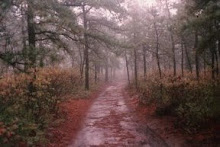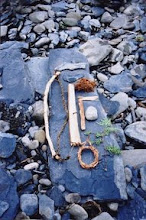Starting Your Own Wilderness Program Words of Advice and Warnings!
So, you've run a few workshops and day programs in primitive living skills for a few years, but you're still working at that pesky full-time carpentry job (or whatever). You'd love to just make the switch from work to teaching skills full time. Hey, then you could spend all your time in the woods and teaching, doing what you love to do! Right? Not so fast, Buckskin Boy (or Girl)! Slow down! Take a deep breath and think this through...
I was once in your position, learning, teaching and working. I couldn't wait to make it to the big time, with my own school, camp or program. I was most familiar with summer camps and at the time there were virtually no “kid” programs around, so I thought it was the perfect way to teach and be in nature all summer long. Besides, I might make some good money too! It was a nice theory, but reality was a bit different. I found there was a price I paid for starting a full time program. I just spent the last three weeks chained to a computer working on a 50-page health & safety manual as required by the New York State Department of Health. I pretty much know the Sanitation Code for children's camps and food service by heart! Been in the woods lately? Man, from my window, it sure looks great...
Let's talk about the things you'll need to run a successful wilderness school, camp or program:
#1. First, you'll need to determine if your local area has enough of a population that is interested in what you're teaching. Is there a large urban or suburban area nearby? What is your plan for getting the word out that you exist to your target audience? How much money do you have for marketing and advertising? What kind of a brochure or flyer are you planning on creating? How much do you estimate this will cost? All of these things will require a plan and lots of time to organize. It will involve weighing pros and cons and possibly taking some risks. (Not to mention start-up money.)
#2. Now, you'll need a location. Where are you going to run your programs? If it is public land, have you checked into
 what you'll need to know/do in order to run your program there? Have you reviewed the requirements or restrictions on that land? (i.e., can you legally harvest plants, make shelters, etc.?) If you're planning to use private land, have you checked with your local zoning ordinances? Called your neighbors to find out if they'll mind 25 dread locked, loin cloth-wearing, yucca beatin', grasshopper eatin' savages wandering around on your place in full view of their family reunion? It is always better to take a good look at this issue before moving on to the next one.
what you'll need to know/do in order to run your program there? Have you reviewed the requirements or restrictions on that land? (i.e., can you legally harvest plants, make shelters, etc.?) If you're planning to use private land, have you checked with your local zoning ordinances? Called your neighbors to find out if they'll mind 25 dread locked, loin cloth-wearing, yucca beatin', grasshopper eatin' savages wandering around on your place in full view of their family reunion? It is always better to take a good look at this issue before moving on to the next one.#3 is...Insurance! Do you have any liability insurance to protect you in the event someone sues you because you didn't give them all the names of the edible plants in the bio-region or because they got too many black fly bites? Do you have medical/accident insurance in case a student needs to go to the Emergency Room to get 12 stitches for a cut made while carving? (Don't laugh, it will happen!) Do you have any first aid or medical training to handle emergencies in the field? These are very important questions too.
#4. We also have the issue of safety. Have you made a plan to deal with any and all possible hazards or situations that may arise? How well trained are all of your instructors and staff, (even if it's just you and your best friend)? Have you contacted your local permit-issuing official before going ahead with plans? (You don't want to have them show up in the middle of your program to close your doors for failure to comply with state/local ordinances!) What governmental agencies handle your type of program and set forth guidelines for safety? Is your building/facility up to "code" in your state? Do you have enough water/septic capacity to handle the number of students you are planning to have attend? Does your cook have the appropriate food service training if you plan to serve food? Who will buy or prepare your supplies? Who will clean and cook during your program? Who handles your phone, mail and basic administration? Who will make sure the van is full of gas, oil checked and all gear safely stowed (including food!)? If your answer to all of the above is "I'll do it!", then you probably should think long and hard before making the jump to the next level. I know from personal experience that you can do it all for a few years, but your program and personal life may suffer if you insist on doing it that way. In the end, you may find that you can't do it all, as each area of responsibility gets increasingly complex and involved. Personal woods time really takes a nose-dive and you may find you're pressured all the time without getting anywhere! It is also helpful to find out if your spouse or partner shares in your desire to put in long hours for free and also to lose family and relationship time to your personal dream and vision. (Better to know now and deal with it than to wait until he/she has the bags packed to go live with the parents!) All of these things are vitally important to the long term success of your school or program
OK, so have I scared you a bit? Good! It is better to enjoy a cold splash of spring water in the face now than to invest time and money into something that you'll abandon three years later from exhaustion and stress! My hope is that what you start as a program will be a success, and that you will know what you are getting into and be able to prepare properly for the challenges that lie ahead.
I have run my camp for eight years now, and taught skills and workshops for over 15 years. I have learned a lot the hard way. I know joys and sorrows from my blood, sweat and tears visionary project. Some days I wouldn’t trade it for anything, (other days, well....make me an offer!) I don't want those of you out there to be discouraged. I am more concerned that you are realistic about what you might be undertaking. There are a lot of opportunities and great projects out there waiting for someone to do. If you are inspired to teach wilderness skills don't let me stop you! Go for it! My main point is to get you to stop and think for a while to consider if you're truly ready to commit to the whole vision and reality, not just the fun stuff like campfires and mud camouflaging. (Chances are, you won't be leading that every night -- you'll be on the phone)!
Here is some personal advice: Take your time. Get some good research and training in every area outlined above. Enjoy being small time and having less administration details to deal with. You might try working in various programs for a while where you won't make as much money but you'll have more fun and “woods” time. It might even be better to just stay small and privately mentor local kids where you are, in your free time. Think of everything, and if you are still passionate and ready to commit, then begin the process. If you can, assemble a team/tribe and work together to make it happen. (That is an educational experience too!) And if all else fails, go into the wilderness, practice one skill for ten years and then come out and write a book. Then start your school. Your chances of being a success will be much higher! In many ways that might be the best advice of all!













2 comments:
HELP!!!!
The Weinberg Nature Center( I ), need to talk to you!!
thanks
AudreyLynne
914 713-8582
very interesting Bolg !!
Well, there is no time like now to start connecting people to nature and the earth and themselves, and it sounds like the Weinberg could be a real source of connection for your local community.
Ultimately, I think all kids should have access to powerful mentoring and natural experiences, and they should be free, in my honest opinion...
It could be school based, or afterschool, as well as part of an expanded sports offerings, or it can be community based, with students having a local place to go throughout the year to learn and grow....
Well, we are working on it! Our biggest problem, believe it or not, is not finding kids, or even finding money, but having enough trained, experienced and committed instructors and educators. Without them, we don't have a program! So that is the focus of Hawk Circle and the Earth Mentoring Institute, pretty much....
Post a Comment